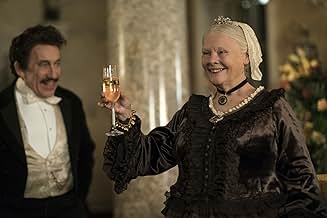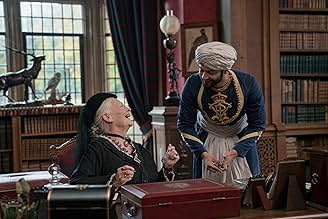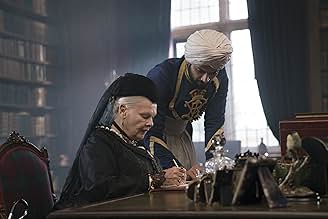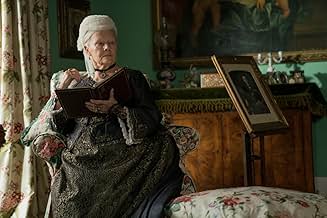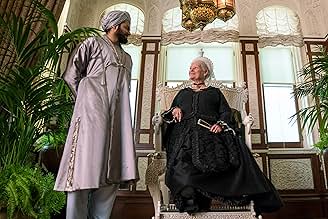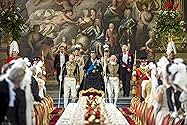NOTE IMDb
6,8/10
39 k
MA NOTE
Une amitié improbable entre la reine Victoria et un jeune employé indien du nom d'Abdul Karim.Une amitié improbable entre la reine Victoria et un jeune employé indien du nom d'Abdul Karim.Une amitié improbable entre la reine Victoria et un jeune employé indien du nom d'Abdul Karim.
- Réalisation
- Scénario
- Casting principal
- Nommé pour 2 Oscars
- 3 victoires et 15 nominations au total
Avis à la une
Last year it was ethnicity that dominated the Oscars and this year it could well be longevity. I recently predicted that, at the age of 91, Harry Dean Stanton could be Oscar's oldest ever Best Actor and even now there is every chance he will be posthumously nominated while Dame Judi, a mere 82, should have no worries in being a sure-fire contender for her performance as Queen Victoria in "Victoria & Abdul". It's a part she has already played in "Mrs. Brown", (losing out to Helen Hunt in "It's As Good as it Gets"), and to be fair, this is something of a walk in the park for her.
We are told the movie is 'mostly' based on actual events but I think we have to take a lot of what we see with a pinch of salt. It's certainly an entertaining picture, if a little twee and whimsical at times, but there is also a little more heft to it than meets the eye. As written by Lee Hall and directed by Stephen Frears this is no mere sentimental, historical romp. It is, of course, the story of the Queen's friendship, in the years before her death, with her Indian servant Abdul Karim, (Ali Fazal, an actor new to me), which until recently was something kept very much under wraps and which was very much opposed to by the Prime Minister, her son the Prince of Wales and the entire royal household and Hall makes this another post-Brexit movie, (I have a feeling we are going to see a lot of post-Brexit movies in the next few years).
What we have here is a film about racism and about empire and it's quite as relevant today as it was back in Victoria's time. Not that you have to take it too seriously; there's a lot of low comedy on display and Frears has assembled an outstanding cast of British character actors. Eddie Izzard is an obnoxious future king, the late Tim Piggot-Smith is quite wonderful as the toadying head of the household, Michael Gambon is the befuddled Prime Minister and Paul Higgins practically walks off with the picture as the Queen's concerned doctor; concerned, not with her health, but with the number of Indians about the place. As a piece of film-making there is, naturally, a large dose of Masterpiece Theatre on display but that, in itself, isn't such a bad thing. "Victoria & Abdul" goes down a treat.
We are told the movie is 'mostly' based on actual events but I think we have to take a lot of what we see with a pinch of salt. It's certainly an entertaining picture, if a little twee and whimsical at times, but there is also a little more heft to it than meets the eye. As written by Lee Hall and directed by Stephen Frears this is no mere sentimental, historical romp. It is, of course, the story of the Queen's friendship, in the years before her death, with her Indian servant Abdul Karim, (Ali Fazal, an actor new to me), which until recently was something kept very much under wraps and which was very much opposed to by the Prime Minister, her son the Prince of Wales and the entire royal household and Hall makes this another post-Brexit movie, (I have a feeling we are going to see a lot of post-Brexit movies in the next few years).
What we have here is a film about racism and about empire and it's quite as relevant today as it was back in Victoria's time. Not that you have to take it too seriously; there's a lot of low comedy on display and Frears has assembled an outstanding cast of British character actors. Eddie Izzard is an obnoxious future king, the late Tim Piggot-Smith is quite wonderful as the toadying head of the household, Michael Gambon is the befuddled Prime Minister and Paul Higgins practically walks off with the picture as the Queen's concerned doctor; concerned, not with her health, but with the number of Indians about the place. As a piece of film-making there is, naturally, a large dose of Masterpiece Theatre on display but that, in itself, isn't such a bad thing. "Victoria & Abdul" goes down a treat.
As we crawl out of the (largely disappointing) summer movie season, the first of the serious award-contenders hoves into view. Victoria and Abdul tells the untold story of a hushed-up relationship between an aged Queen Victoria (Judi Dench, "Philomina", "Spectre") and her Indian servant, Abdul Kareem (Ali Fazal).
Kareem is shipped to England from Agra to deliver a ceremonial coin to the Queen on the occasion of her Diamond Jubilee, together with a grumbling 'stand-in tall guy' Mohammed (Adeel Akhtar, "The Big Sick", "Four Lions"). Kareem finds the Queen as sour, depressed and acidic as her post-Albert reputation would have you imagine. But something clicks between the two, and pretty soon the perked-up queen is learning Urdu and all about the Koran, much to the horror of her successor Teddy, the Prince of Wales (a splendid Eddie Izzard, "Oceans 13") and the rest of the royal household, who try desperate measures to derail the relationship.
This film is a complete delight. I went along without great expectations.... a worthy film I thought I should go and see to write a worthy review about. But I was entranced from beginning to end. It's probably best described as a comedy drama... always a difficult trick for a movie-maker to pull off. But here in the competent hands of director Stephen Frears ("Florence Foster Jenkins") the comedy is both very, VERY funny, with the drama also being extremely moving. And crucially the transition between the two never feels forced.
I've seen a few critical comments that the film's underlying topic - the subjugation of the Indian state and the queen's role in that, is a "serious topic" and not a suitable subject for a comedy like this. And of course, "the Empire" is a terrible legacy that the British people have around their necks in the same manner as Germans have their Nazi past and the American South have their history of slavery. But the film never really gets into these issues in any depth: Abdul's background, whilst sketchily drawn and feeling rather sanitised for the late 1800's, is one of a middle-class Indian with a decent colonial job: someone shown respect by his British managers. While the "uprising" of Muslims is mentioned - indeed it's a key part of the story - Victoria's lack of knowledge of such things, or indeed of all things to do with the country she is 'Empress' of, is made clear. The focus of the film is quite rightly on the understandable scandal (for the day) of the queen of England (and hence head of the Church of England) having a spiritual teacher (or "Munshi") who is neither white nor Christian. If there is a criticism to be made of the splendid script by Lee Hall ("War Horse") it is that the racial references - and there are a few - feel rather over-sanitised given the tensions that erupt as the story unfolds.
Above all, this is an acting tour de force for Dame Judi, reprising her role as the elderly queen from "Mrs Brown" which (shockingly!) is now 20 years old. I know its early in the season to be placing bets, before having seen any of the other major contenders, but Dench's "insanity" speech screams "Oscar reel" to me. Her performance is masterly from beginning to end.
Rather overshadowed by Dench is the relative newcomer to western cinema Ali Fazal (he had a role in the "Furious 7" film). But his performance is almost as impressive, bringing the warmth and compassion to the supporting role that is so sorely needed if the overall balance of the film is to be maintained.
The supporting cast is equally stellar with Olivia Williams ("An Education", "The Sixth Sense") acidic as Baroness Churchill; Simon Callow ("Four Weddings and a Funeral") as Puccini; Michael Gambon ("Harry Potter") as Lord Salisbury and Tim Pigott-Smith as Henry Ponsonby, head of the royal household. This was Pigott-Smith's final live-action performance before his untimely death at the age of only 70 in April of this year: and it's sad to say that he really doesn't look well in this film. Also of note is Fenella Woolgar as lady's maid Miss Phipps, comical as a the quivering wreck holding the shortest straw in having to face up to her ferocious mistress.
Another star of the show is the Scottish countryside, ravishingly photographed by Danny Cohen ("Florence Foster Jenkins", "Room") with this film probably doing more for the Scottish Tourist Board than any paid for advertising could ever do!
As the film comments it's "Based on a True Story... Mostly", and this tease of a caption both infuriates and intrigues in equal measure. I may feel obliged to delve into the original source material by Shrabani Basu to learn more.
Overall this is a true delight of a film, perfectly balanced, brilliantly acted: I would say this is a "must see" for any older viewers over the age of 50 in need of a cinema outing that doesn't disappoint. This is everything that (for me) "Viceroy's House" should have been but wasn't. Highly recommended.
(For the graphical version of this review, please visit www.bob-the- movie-man.com. Thanks.)
Kareem is shipped to England from Agra to deliver a ceremonial coin to the Queen on the occasion of her Diamond Jubilee, together with a grumbling 'stand-in tall guy' Mohammed (Adeel Akhtar, "The Big Sick", "Four Lions"). Kareem finds the Queen as sour, depressed and acidic as her post-Albert reputation would have you imagine. But something clicks between the two, and pretty soon the perked-up queen is learning Urdu and all about the Koran, much to the horror of her successor Teddy, the Prince of Wales (a splendid Eddie Izzard, "Oceans 13") and the rest of the royal household, who try desperate measures to derail the relationship.
This film is a complete delight. I went along without great expectations.... a worthy film I thought I should go and see to write a worthy review about. But I was entranced from beginning to end. It's probably best described as a comedy drama... always a difficult trick for a movie-maker to pull off. But here in the competent hands of director Stephen Frears ("Florence Foster Jenkins") the comedy is both very, VERY funny, with the drama also being extremely moving. And crucially the transition between the two never feels forced.
I've seen a few critical comments that the film's underlying topic - the subjugation of the Indian state and the queen's role in that, is a "serious topic" and not a suitable subject for a comedy like this. And of course, "the Empire" is a terrible legacy that the British people have around their necks in the same manner as Germans have their Nazi past and the American South have their history of slavery. But the film never really gets into these issues in any depth: Abdul's background, whilst sketchily drawn and feeling rather sanitised for the late 1800's, is one of a middle-class Indian with a decent colonial job: someone shown respect by his British managers. While the "uprising" of Muslims is mentioned - indeed it's a key part of the story - Victoria's lack of knowledge of such things, or indeed of all things to do with the country she is 'Empress' of, is made clear. The focus of the film is quite rightly on the understandable scandal (for the day) of the queen of England (and hence head of the Church of England) having a spiritual teacher (or "Munshi") who is neither white nor Christian. If there is a criticism to be made of the splendid script by Lee Hall ("War Horse") it is that the racial references - and there are a few - feel rather over-sanitised given the tensions that erupt as the story unfolds.
Above all, this is an acting tour de force for Dame Judi, reprising her role as the elderly queen from "Mrs Brown" which (shockingly!) is now 20 years old. I know its early in the season to be placing bets, before having seen any of the other major contenders, but Dench's "insanity" speech screams "Oscar reel" to me. Her performance is masterly from beginning to end.
Rather overshadowed by Dench is the relative newcomer to western cinema Ali Fazal (he had a role in the "Furious 7" film). But his performance is almost as impressive, bringing the warmth and compassion to the supporting role that is so sorely needed if the overall balance of the film is to be maintained.
The supporting cast is equally stellar with Olivia Williams ("An Education", "The Sixth Sense") acidic as Baroness Churchill; Simon Callow ("Four Weddings and a Funeral") as Puccini; Michael Gambon ("Harry Potter") as Lord Salisbury and Tim Pigott-Smith as Henry Ponsonby, head of the royal household. This was Pigott-Smith's final live-action performance before his untimely death at the age of only 70 in April of this year: and it's sad to say that he really doesn't look well in this film. Also of note is Fenella Woolgar as lady's maid Miss Phipps, comical as a the quivering wreck holding the shortest straw in having to face up to her ferocious mistress.
Another star of the show is the Scottish countryside, ravishingly photographed by Danny Cohen ("Florence Foster Jenkins", "Room") with this film probably doing more for the Scottish Tourist Board than any paid for advertising could ever do!
As the film comments it's "Based on a True Story... Mostly", and this tease of a caption both infuriates and intrigues in equal measure. I may feel obliged to delve into the original source material by Shrabani Basu to learn more.
Overall this is a true delight of a film, perfectly balanced, brilliantly acted: I would say this is a "must see" for any older viewers over the age of 50 in need of a cinema outing that doesn't disappoint. This is everything that (for me) "Viceroy's House" should have been but wasn't. Highly recommended.
(For the graphical version of this review, please visit www.bob-the- movie-man.com. Thanks.)
Greetings again from the darkness. Director Stephen Frears has enjoyed a long career by focusing on the interesting stories of people, rather than the salient specifics of history or politics. He received Oscar nominations for THE QUEEN and THE GRIFTERS, and helmed other crowd-pleasers such as MRS. HENDERSON PRESENTS, PHILOMENA, HIGH FIDELITY, and FLORENCE FOSTER JENKINS. While purely entertaining movies are always welcome, it's important to note the filmmaker's approach when the story is entwined with historical importance.
"Based on real events mostly" is Mr. Frears' cutesy way of kicking off the film and asking us to enjoy the unusual story of connection between a Queen and a servant, and cut him some slack on the historical depth. For most of us, the real enjoyment will be derived from watching yet another standout performance from Oscar winner (and 7 time nominee) Dame Judi Dench as the longest-reigning monarch, Queen Victoria in her elderly years. It's a role she played twenty years ago in MRS. BROWN, and her relationship with John Brown (presented in that film) has some parallels to what we see here with Abdul Karim (Ali Fazal). Dame Judi is the rare actress who can capture both the loneliness and tiresome burden of six decades of rule and the re-invigorated woman we see learning a new language and new religion. She plays weary and spunky with equal believability.
Victoria was Queen of the United Kingdom of Great Britain and Ireland and Empress of India, and in 1861 her beloved husband Prince Albert died. This film picks up in 1887 with the pomp and circumstance of the Golden Jubilee – a celebration of her 50 years of rule. The early scenes tease us with obstructed views, and the comedic element becomes quite obvious as we see her so carelessly slurping her soup at the formal lunch. Part of the celebration includes the presentation of an honorary coin by two Indians peasants Abdul (Fazal) and Mohammed (Adeel Akhtar), the first chosen because of his height, and the second as a last minute fill-in.
Lee Hall (Oscar nominated for BILLY ELLIOT) wrote the screenplay based on the book by Shrabani Basu. The journals of Abdul Karim were only discovered in 2010, a hundred years after his death. Some of the less favorable moments of this era are mentioned, but most of the Queen's lack of knowledge or awareness is attributed to the "boring" reports from her advisers. This leads to some awkward moments later in the film regarding the Muslim mutiny and the subsequent Fatwa.
Rather than dwell on history, the film prefers to focus on the unconventional friendship and the re-awakening of the Queen. Abdul becomes her "Munshi" – a spiritual adviser and her teacher of Urda and the Koran. As you would expect, this is all quite scandalous and frustrating for those such as Prime Minister Lord Salisbury (Michael Gambon), Lady Churchill (Olivia Williams), Victoria's son Bertie (Eddie Izzard), and the royal staff: Sir Henry (the recently deceased Tim Pigott-Smith), her physician Dr Reid (Paul Higgins), and her quivering maid Miss Phipps (Fenella Woolgar). There is even a comical sequence with the great singer Puccini (Simon Callow) as the Queen herself belts out the Gilbert and Sullivan song "I'm Called Little Buttercup".
Balmoral, the Isle of Wight, and Windsor Castle are all part of the breath-taking scenery, while the absurdity of the royal status is viewed through the eyes of the Indian servants. Most of the focus is on Victoria's transformation from joyless, isolated monarch to the anything-but-insane (an Oscar worthy scene) and eager to engage elderly woman (one who has an entire era named after her) falling back in love with life as she fights off "the banquet of eternity". Come for the laughs and the performance of Dame Judi just not for a history lesson.
"Based on real events mostly" is Mr. Frears' cutesy way of kicking off the film and asking us to enjoy the unusual story of connection between a Queen and a servant, and cut him some slack on the historical depth. For most of us, the real enjoyment will be derived from watching yet another standout performance from Oscar winner (and 7 time nominee) Dame Judi Dench as the longest-reigning monarch, Queen Victoria in her elderly years. It's a role she played twenty years ago in MRS. BROWN, and her relationship with John Brown (presented in that film) has some parallels to what we see here with Abdul Karim (Ali Fazal). Dame Judi is the rare actress who can capture both the loneliness and tiresome burden of six decades of rule and the re-invigorated woman we see learning a new language and new religion. She plays weary and spunky with equal believability.
Victoria was Queen of the United Kingdom of Great Britain and Ireland and Empress of India, and in 1861 her beloved husband Prince Albert died. This film picks up in 1887 with the pomp and circumstance of the Golden Jubilee – a celebration of her 50 years of rule. The early scenes tease us with obstructed views, and the comedic element becomes quite obvious as we see her so carelessly slurping her soup at the formal lunch. Part of the celebration includes the presentation of an honorary coin by two Indians peasants Abdul (Fazal) and Mohammed (Adeel Akhtar), the first chosen because of his height, and the second as a last minute fill-in.
Lee Hall (Oscar nominated for BILLY ELLIOT) wrote the screenplay based on the book by Shrabani Basu. The journals of Abdul Karim were only discovered in 2010, a hundred years after his death. Some of the less favorable moments of this era are mentioned, but most of the Queen's lack of knowledge or awareness is attributed to the "boring" reports from her advisers. This leads to some awkward moments later in the film regarding the Muslim mutiny and the subsequent Fatwa.
Rather than dwell on history, the film prefers to focus on the unconventional friendship and the re-awakening of the Queen. Abdul becomes her "Munshi" – a spiritual adviser and her teacher of Urda and the Koran. As you would expect, this is all quite scandalous and frustrating for those such as Prime Minister Lord Salisbury (Michael Gambon), Lady Churchill (Olivia Williams), Victoria's son Bertie (Eddie Izzard), and the royal staff: Sir Henry (the recently deceased Tim Pigott-Smith), her physician Dr Reid (Paul Higgins), and her quivering maid Miss Phipps (Fenella Woolgar). There is even a comical sequence with the great singer Puccini (Simon Callow) as the Queen herself belts out the Gilbert and Sullivan song "I'm Called Little Buttercup".
Balmoral, the Isle of Wight, and Windsor Castle are all part of the breath-taking scenery, while the absurdity of the royal status is viewed through the eyes of the Indian servants. Most of the focus is on Victoria's transformation from joyless, isolated monarch to the anything-but-insane (an Oscar worthy scene) and eager to engage elderly woman (one who has an entire era named after her) falling back in love with life as she fights off "the banquet of eternity". Come for the laughs and the performance of Dame Judi just not for a history lesson.
What an amazing movie, Judi is as usual, such a wonderful actress portraying Queen Victoria once again. The story line is fantastic and it flows beautifully. This would have to be the best film for me this year. I love how they made this film so funny, and yet so touching. I laughed and I cried all the way through.
Being a Pakistani, and a Muslim, I was quite looking forward to watch Victoria & Abdul. It seemed as if a new perspective had been depicted on the subcontinent and the British attitudes towards her colonies. However, this film does not feel real at all. It seems the Queen follows Abdul blindly; this seems strange for a lady who was the Empress of India. Although it is a true story, I feel they could have done much more with the movie so that it would feel real at least. Or maybe the relation between the two was quite unreal.
Le saviez-vous
- AnecdotesWhen filming began in September 2016, Judi Dench was one month older than Queen Victoria was when she died.
- GaffesAt least twice, Abdul refers to his home province as "Uttar Pradesh". That name was coined in 1950. At the time depicted in the movie, the area was called "United Provinces".
- Citations
Abdul Karim: Listen, little drop, give yourself up without regret and in return you will gain the ocean. Give yourself away and in the great sea you will be secure.
- Crédits fousBegins with text that says it is "Based on real events... mostly".
- ConnexionsFeatured in Today: Épisode datant du 31 mai 2017 (2017)
Meilleurs choix
Connectez-vous pour évaluer et suivre la liste de favoris afin de recevoir des recommandations personnalisées
- How long is Victoria & Abdul?Alimenté par Alexa
Détails
- Date de sortie
- Pays d’origine
- Sites officiels
- Langues
- Aussi connu sous le nom de
- Victoria & Abdul
- Lieux de tournage
- Sociétés de production
- Voir plus de crédits d'entreprise sur IMDbPro
Box-office
- Budget
- 21 000 000 $US (estimé)
- Montant brut aux États-Unis et au Canada
- 22 245 070 $US
- Week-end de sortie aux États-Unis et au Canada
- 158 845 $US
- 24 sept. 2017
- Montant brut mondial
- 66 558 465 $US
- Durée1 heure 51 minutes
- Couleur
- Mixage
- Rapport de forme
- 2.35 : 1
Contribuer à cette page
Suggérer une modification ou ajouter du contenu manquant








